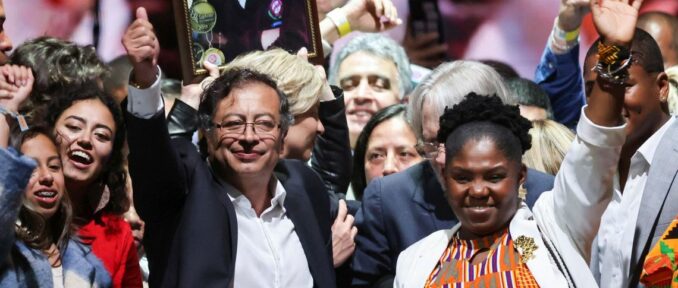Colombians elect Gustavo Petro, beating right wing

Gustavo Petro and Francia Márquez greet Colombian masses.
Voters in Colombia made history June 19, when they elected the first progressive president in the country’s history. Gustavo Petro, previously a legislator and mayor of Bogota and one-time combatant with the M-19 guerrilla army, defeated right-wing candidate Rodolfo Hernández in a runoff election. Petro and Vice President-elect Francia Márquez — an environmentalist and the country’s first Afro-Colombian vice president — take office August 7.
Petro was previously the highest vote-getter in the May general election, where the right-wing ruling party’s candidate, Federico Gutiérrez, was defeated in the first round. Since the vote of the two rightist candidates combined was enough to defeat Petro, it was uncertain who would prevail June 19. Petro and Francia had the lead with 53% of the vote, beating Hernández by over half a million votes.
The new president will face huge difficulties. The right wing still controls the military and the legislature and has enjoyed strong support from Washington under both Democratic and Republican administrations. Fascist paramilitaries remain armed and, in the period leading up to the election, assassinated candidates and campaign workers with the Historical Pact, the electoral bloc behind Petro.
But for the frequent targets of assassinations and terror — labor unionists, environmentalists, current and former guerrilla combatants, Indigenous and Afro-Colombian communities and others — Petro’s election allows them to breathe easier, knowing the paramilitaries will no longer operate with impunity.
The election in Colombia follows a recent trend in Latin America of wins by progressive candidates, including in Honduras, Nicaragua, Peru, Chile and Venezuela last year. However, as Telesur commented June 24: “The new wave of progressivism aims to change the society but not the system, as the intention to impart justice and redistribute wealth is carried out within the rules of capitalism. Thus, the aspiration to transform Latin America under the model of the ‘Socialism of the 21st Century’ has been lately forgotten.”
The victory for the Historical Pact is nevertheless giving Washington the jitters, as Petro has already taken steps to restore friendly relations with Venezuela and its president, Nicolás Maduro. “I have communicated with the Venezuelan government to open the borders and restore the full exercise of human rights on the border,” Petro tweeted. Maduro in turn tweeted that “The will of the Colombian people, who came out to defend the path of democracy and peace, was heard. New times are on the horizon for this sister country.”
‘Like a new dawn’
Petro opposes the U.S. War on Drugs as applied in Colombia, with a “scorched-earth” policy to eradicate coca production without creating economic alternatives for coca farmers. His priorities include addressing poverty and income inequality in Colombia, which has one of the highest rates of extreme poverty in Latin America. Petro wants to renegotiate the Colombia-U.S. Free Trade Agreement to be less tilted toward U.S. corporate interests.
The president-elect has pledged to implement the terms of the peace agreement between the Colombian government and the Revolutionary Armed Forces of Colombia-Peoples Army (FARC-EP), which current President Ivan Duque attempted to scrap, leading some decommissioned FARC-EP combatants to form “dissident” groups and resume the armed struggle.
FARC-EP Segunda Marquetalia, one of the two dissident groups, said in a June 22 statement welcoming the election results: “Let us all meet at the front lines of the struggles for social justice, for the plurality of conscience — as Petro says — and for solidarity between peoples of variously colored skin and variously colored flags. Let us continue onward for agrarian justice and land for the peasantry, for a productive and decarbonized economy, new technologies and for a country with clean energy and environmental justice.
“We support the government of life and hope that is being born before our eyes like a new dawn. A government that is disposed to return us to peace and dignity, as well as to defend the world from climate change with the shield of the Amazon rainforest. This must be expanded by uniting forces between the Amazonian countries of our America in order to absorb carbon and return it to the world as oxygen.
“It is a wise decision from the new government to promote more active integration in Latin America and the Caribbean. For let us not forget that Monroeism is still alive and conspiring against our unity in order to dominate us without our resistance.
“Let us protect Petro and Francia to assure that nothing happens to them and that they have a long life that allows them to bring about the Colombia of the future.”

